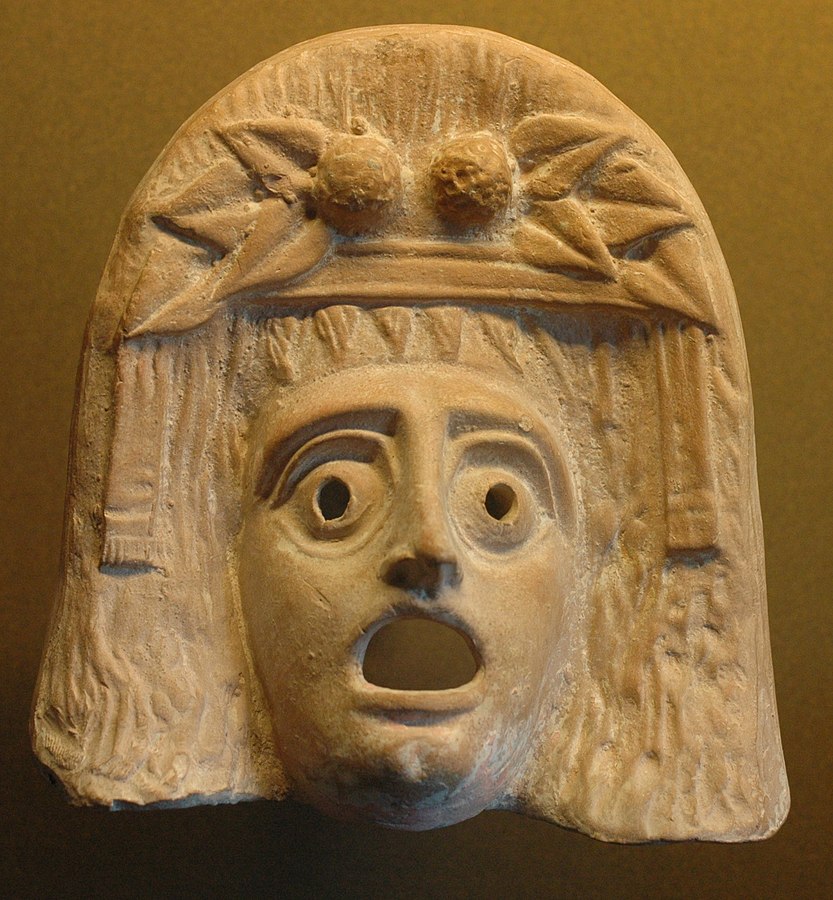The best tragedy writers are Emily Bronte, Shakespeare, Arthur Miller, Sophocles, and John Steinbeck. These writers have composed works of immense power which offer moral lessons, and catharsis packaged as compelling tales featuring beloved characters, and mesmerizing plots.
What is Tragedy?
Tragedy is a form as old as writing itself. It originates in Greece as theatre. This was a time before mass publishing made books inexpensive enough for the average citizen to own, but they sure could listen to a performance!
Aristotle provides one of the leading definitions of tragedy in his Poetics. This text has a difficult history to trace, and modern scholars disagree about the origin and translation of many of the key terms.
In essence, tragedies are usually sad stories in which the protagonist goes from a high place to a low one: in which we see the protagonist experience suffering due to an error they have made. This suffering elicits fear and pity in the audience, which cleanses them of many negative emotions, in a process termed catharsis.
Is Tragedy Worth Reading?
Tragedy is definitely worth reading. In a sense, tragedies are morality tales in which the moral lesson is the tragic flaw. So when we see Macbeth or Oedipus make crucial errors, we can learn the lesson and avoid making similar mistakes ourselves. Tragedies in this way are timeless.
But why should we read sad stories? Well, sometimes we like feeling sad. Contrary to what may at first appear common sense, we don’t always want stories that make us feel happy. When times are good, we like a tragedy. Often when times are bad we turn to comedies to cheer us up. It’s all about balance.
Shakespeare
Shakespeare is widely acknowledged as one of the leading tragedians of all time. Interestingly, contemporary scholars believe that he may not have had access to the Greek tragedians, but did read Roman writers.
Shakespeare’s tragedies are the most well known of all. In Macbeth we see man whose ambition conquers his common sense, and leads him to kill the King. His life disintegrates around him after that, leading to a tortured mental state and the death of his wife (and many others). We learn about the dangers of excessive ambition.
In Hamlet we see the destruction of a family, due to Hamlet’s uncle murdering his father. Bit of a theme about the dangers of killing kings, isn’t there? Hamlet the text traces the mental disintegration of a young man under extraordinary strains, and is celebrated as one of the finest explorations of the human mind in literature.
Shakespeare wrote at least 37 plays, many of which are tragedies. Try reading King Lear or Richard III. You won’t be disappointed!

Arthur Miller
Arthur Miller is probably the most celebrated contemporary tragedian of the theater. Death of a Salesman tells the tale of a man who tragically suffers anguish due to his inability to come up to his own standards: these standards are broadly those implied in the ‘American Dream’ or the set of notions around what a man in the US should attain in order to feel successful and valued.
The Crucible is another of Miller’s tales which has been heralded as one of the greatest works of Western literature. It was written in response to the McCarthy hearings in the United States, which sought to identify Communist influence in the country. The tale concerns a literal witch hunt, and warns of the dangers of prosecution without sufficient evidence, and also hysteria.
Emily Brontë
Emily Brontë was a nineteenth century novelist of great power. Her tale Wuthering Heights is one of the most cherished novels, and exhibits Gothic and Romanticism. It’s an incredibly powerful and moving tale, which challenged Victorian morality with its portrayal of fiery love, and domestic abuse. It all ends badly, as many of the greatest love stories do!
Sophocles
Sophocles is an Ancient Greek gentleman, who is one of only three Ancient Greeks to have at least one play survive to modern times. These plays are Oedipus at Colonus, Antigone, Women of Trachis, Oedipus Rex, Electra, Philoctetes and Ajax.
Oedipus is his most famous work, recounting the tale of a man who is fated to kill his father and marry his mother. Despite his best intentions, his fate comes to pass. Oof. It’s chilling stuff and so horrible that catharsis does seem to be the dominant effect, as one emerges from the nightmare realm and back into reality.
John Steinbeck
Steinbeck is a titan in American letters. His most famous work is probably Grapes of Wrath which won the Pulitzer Prize for fiction: he also won the Nobel Prize in recognition of his entire body of work. Of Mice and Men is a novella: a tragic tale which concerns the lives of two men which starts in a bad place and goes ever wronger from there. Two migrant ranch workers make their way across the California during the great depression, and get in about as much trouble as you can imagine.
Conclusion
So there you have it, tragedy is worth reading. It doesn’t always make us happy in immediate or easily definable ways. But it can clear our emotional palette via catharsis, and it can teach us valuable lessons which help us to avoid sad or tragic outcomes in our own lives. Besides, the form features amazing characters and plots which stay with us forever as cherished memories.

